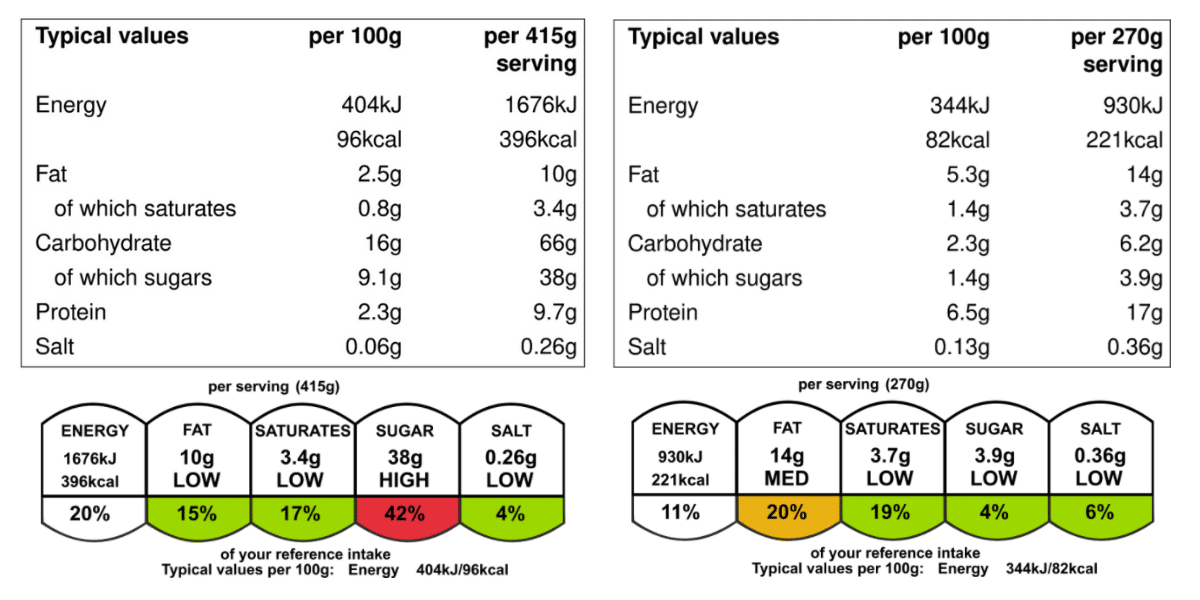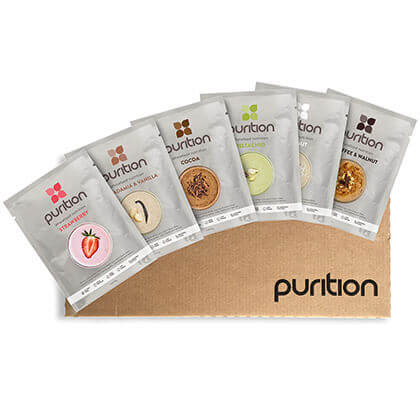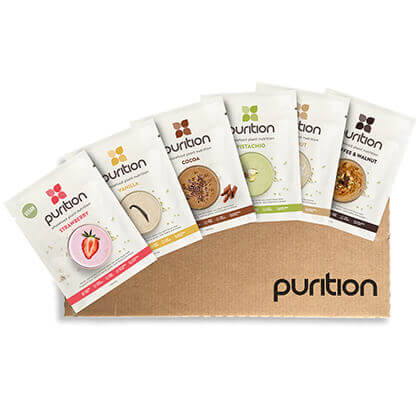Are smoothies healthy? The sugar-laden truth

Loaded with fruits, veggies and superfood powders, smoothies hold a major health halo. But are smoothies healthy or are they laden with hidden sugars? We did a bit of investigating for ourselves in our smoothie case study…
Whether it’s as a quick breakfast, a post workout fuel-up or simply a ‘healthy’ way to curb a sweet tooth, smoothies are a health food favourite. But despite being loaded with vibrant, fresh and nutrient-packed produce, smoothies come with one not-so-healthy problem: sugar.
The sugar-laden smoothie truth
Are smoothies healthy? Turns out, it’s complicated.
For most people, the key smoothie ingredient is fruit. Lots of it. There’s no doubt that whole fruit, in moderation, is a very healthy food. It’s packed with fibre, vitamins, minerals, antioxidants and loads of other fruity, gut-healthy goodness. It is, however, very high in sugar compared to other whole foods.
But as smoothies blend fruit into liquid, it’s easy to gulp several servings of sugar-heavy fruit down in seconds.
Additionally, when you blend fruit into a smoothie, the fruit’s structure is broken down. That means your body doesn’t need to spend time breaking down the fibre (which would normally slow down digestion) because the blender has already done the job for you.
Together, this means that when you drink a fruit-heavy smoothie…
- The sugar will hit your bloodstream quicker
- Your body may store some of the excess sugar as fat
- Your blood sugar could go haywire… then crash
- The crash could leave you feeling hungry and tired
- You’ll be more likely to overeat calories later in the day
Regularly eating too much sugar – including the sugar found in smoothies – contributes towards obesity, tooth decay and a greater risk of type-2 diabetes.
When it comes to oats, another popular smoothie ingredient, the story is similar. Whole oats take time to break down in the stomach and digest slowly, drip-feeding their carb load (sugar) into your body over time. However, as soon as you blend oats, they digest much quicker. This means that the sugar will enter your bloodstream in minutes, rather than hours. The result? A steep blood sugar spike, followed by a rapid decline.
This isn’t to demonise smoothies. With the right ingredients and macronutrient composition, a smoothie can still be a healthy choice. It’s just important to be wary of their sugar content if you’re choosing to drink them daily.

Case study: Homemade smoothies vs Purition
Last week, a customer told us she was worried about how healthy her ‘healthy’ homemade smoothies really were.
“I have a smoothie every morning for breakfast, this usually consists of banana, frozen berries, oats, oat milk, yoghurt and honey. Then alternating chia and flax seeds. I’m slightly concerned about my free sugar intake with my current smoothie mixture and after a bit of guidance really?”
We put the ingredients into our nutritional software to gauge a clearer picture of the real nutritional value of her morning smoothie.
Banana & berry breakfast smoothie
Here's what our customer used:
- 200ml of oat milk
- 1 medium peeled banana
- 30g oats
- 3 dessert spoons (30g) of plain greek yoghurt
- 30g mixed frozen berries
- 1 tbsp chia seeds
- 1 tsp (10g)f honey
All perfectly healthy and natural ingredients, but here’s the nutritional outcome:

This little lot came to a whopping 65g carbs and 37g sugar. For perspective, that’s just 2g shy of the sugar content in an entire can of full-sugar Coca-Cola… or over 9 teaspoons of sugar.
The total calories were 396kcal, but 264 calories (67%) came from carbohydrates, of which 152 calories (38% of the total) came from sugar alone. These are what we generally refer to as ‘empty’ calories, since they contain energy, but very little in the way of meaningful nutrition. This could:
- Promote insulin production and fat storage
- Cause energy to peak and dip throughout the day
- Lead to sugar cravings and hunger
Instead, we recommend Purition. Purition is a healthy, nutritious, real food smoothie alternative, without the heavy carb and sugar load. Here’s the nutritional value of our customer’s homemade smoothie (left), to the equivalent-tasting 40g Purition Original Banana with 200ml almond milk & 1 handful (30g) of berries (right).

Left: Homemade smoothie Right: Purition smoothie
Same creamy banana and berry flavour, but 60g fewer carbohydrates, 34g less sugar and 7g extra protein.

Although the Purition shake only contains around 221kcal (with just 4g of natural sugars), it’ll keep you satisfied for longer than the 396kcal calories found in the homemade smoothie. This is because we’ve added more protein and healthy unsaturated fats, rather than empty, sugar-loaded carbohydrates.
Unlike the homemade smoothie, Purition will not kick start insulin production (the fat-storage hormone), spike your blood sugars or stimulate sugar cravings. Plus, as Purition has a negligible effect on your blood sugar levels, it’ll provide sustained energy throughout the day.
While we knew all of this already, it was pretty interesting to see these stats side-by-side, which triggered a bit of a smoothie case study on our part. Let’s see how other online ‘healthy breakfast smoothie’ recipes compare to the equivalent-tasting Purition shake.
Vegan coffee breakfast smoothie

Homemade smoothie
- 200ml coconut milk
- 20g oats
- 1 large frozen banana
- 2 tbsp nut butter
- 2 tsp instant coffee powder
- 2 tbsp maple syrup
Purition equivalent
- 40g Purition Vegan Coffee & Walnut
- 200ml coconut milk
- Extra coffee shot
- Handful of ice

Left: Homemade smoothie Right: Purition smoothie
Same morning coffee pick-me-up, but 45g fewer carbohydrates, 29g less sugar and 7g extra protein.
Green breakfast smoothie

Homemade smoothie
- 1 kiwi
- 1 apple, peeled and cored
- Juice of ½ lime
- 30g spinach
- 150ml nut milk
- 100g plain yoghurt
Purition equivalent
- 40g Purition Mac & Vanilla
- 200ml almond milk
- ½ kiwi
- 30g spinach

Left: Homemade smoothie Right: Purition smoothie
Same vitamin-packed green breakfast shake, but 16g fewer carbohydrates, 18g less sugar & 9g extra protein.
Are smoothies healthy? The bottom line
2 of the 3 homemade smoothie recipes we tested seemed super healthy on paper, but contained more sugar than an entire can of red (full sugar) Coca-Cola. If you’ve been choosing a homemade smoothie as a healthy option, this might have come as a bit of a surprise.
All-natural smoothies packed with fresh fruit and oats are likely to contain a lot of sugar. While they might provide a worthy vitamin-boost, sipping on a sugar-packed smoothie for breakfast could seriously rev up your appetite and calorie intake later in the day. On top of that, consuming too much sugar, too often, could increase your risk of developing type-2 diabetes and becoming overweight.
So, are homemade smoothies healthy? Nutritionally speaking, when smoothies are loaded with carbs and sugar but offer little in terms of protein and fat, we’d say that homemade smoothies are not the healthiest breakfast option. To make a genuinely healthy smoothie, focus on the addition of healthy fats and protein, green veggies, unsweetened milk and a small serving of fruit. This should reduce the simple sugar and carb content of your shake (though we’d recommend double-checking the nutritional information for yourself) and keep you feeling fuller for longer.
Ultimately, by basing your homemade smoothies on protein and healthy fats, while moderating the sugar (fruit) content, a smoothie can be a healthychoice.
Simplify healthy smoothies with Purition
Homemade smoothies can take a lot of time, trial and error to get right. Plus, all the separate ingredients can quickly become expensive. If you’re looking for a quick and efficient way to make a low-sugar, protein-packed smoothie, why not give Purition a go instead?

Purition is a low-sugar smoothie blend made with 100% whole food ingredients of nuts, seeds and a vegetarian or vegan protein source. With 14+ flavours to choose from, a single serving provides around 16g of protein, 12g healthy fats and 6g fibre, plus a host of naturally-occurring vitamins and minerals.
Just add a few scoops to your blender with milk, ice and optional fruit (we’d still recommend sticking to one serving) and veggies. A protein-packed, filling and genuinely healthy smoothie meal, ready in an instant!
Read more...
Banana, blueberry & mango
breakfast shake
Super berry
smoothie bowl
How to make a healthy smoothie
+ 10 recipes
How to increase your protein intake
What you should do next...
1. Subscribe to our newsletter
Subscribe to our newsletter for the latest news, recipes and advice about healthy eating.
2. Try Purition for 14 days
Unlock all the benefits of a whole foods diet with none of the effort. Get 2 weeks of easy nutritious meals & pick your own flavours!


